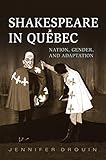Shakespeare in Quebec : Nation, Gender, and Adaptation / Jennifer Drouin.
Material type: TextPublisher: Toronto : University of Toronto Press, [2014]Copyright date: ©2014Description: 1 online resource (296 p.)Content type:
TextPublisher: Toronto : University of Toronto Press, [2014]Copyright date: ©2014Description: 1 online resource (296 p.)Content type: - 9781442647978
- 9781442669697
- 822.3/3 23
- PR3109.C3 D75 2014eb
- online - DeGruyter
| Item type | Current library | Call number | URL | Status | Notes | Barcode | |
|---|---|---|---|---|---|---|---|
 eBook
eBook
|
Biblioteca "Angelicum" Pont. Univ. S.Tommaso d'Aquino Nuvola online | online - DeGruyter (Browse shelf(Opens below)) | Online access | Not for loan (Accesso limitato) | Accesso per gli utenti autorizzati / Access for authorized users | (dgr)9781442669697 |
Frontmatter -- Contents -- Acknowledgments -- Introduction -- 1 Postcolonial Shakespeares and Gendering the Québec Nation -- 2 A Theory of Shakespearean Adaptation -- 3 The Quiet Revolution: Passer à l’action -- 4 Tyrants and Usurpers: Tradapting the Conquest -- 5 The First Referendum: Daughters of the Carnivalized Nation -- 6 The Second Referendum: Plurality without Pluralism -- Conclusion: Québec v. Canada: Interculturalism and the Politics of Recognition -- Appendix: Chronology of Québécois Adaptations of Shakespeare, 1960–2013 -- Notes -- Works Cited -- Index
restricted access online access with authorization star
http://purl.org/coar/access_right/c_16ec
In Shakespeare in Québec, Jennifer Drouin analyses representations of nation and gender in Shakespearean adaptations written in Québec since the Quiet Revolution. Using postcolonial and gender theory, Drouin traces the evolution of discourses of nation and gender in Québec from the Conquest of New France to the present, and she elaborates a theory of adaptation specific to Shakespeare studies.Drouin’s book explains why Québécois playwrights seem so obsessed with rewriting “le grand Will,” what changes they make to the Shakespearean text, and how the differences between Shakespeare and the adaptations engage the nationalist, feminist, and queer concerns of Québec society.Close readings from ten plays investigate the radical changes to content that allowed Québécois playwrights to advocate for political change and contribute to the hot debates of the Quiet Revolution, the 1970 October Crisis, the 1980 and 1995 referenda, the rise of feminism, and the emergence of AIDS. Drouin reveals not only how Shakespeare has been adapted in Québec but also how Québécois adaptations have evolved in response to changes in the political climate. As a critical analysis in English of rich but largely ignored French plays, Shakespeare in Québec bridges Canada’s “two solitudes.”
Mode of access: Internet via World Wide Web.
In English.
Description based on online resource; title from PDF title page (publisher's Web site, viewed 01. Dez 2023)


